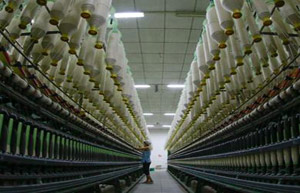Much of the rest of the world, however, faces a different, if not opposite challenge. Europe and Japan, the other two major economic forces other than the United States among the developed economies, are both struggling with lackluster economic growth and aging population. A contracting labor force and decreasing demand have forced companies in Europe and Japan to turn their attention to the huge and booming market in China.
In addition, European companies have made considerable foreign direct investment in China in order to operate directly in the world's most populous market.
Such bets have played out nicely and brought handsome investment returns. Now that China's economy is slowing down and labor is not as cheap and attractive as it was a decade ago, what will the impact be for European companies and economies, many may wonder.
It should come as no surprise that the European economy will be unavoidably affected by the slowdown in China. After all, China now ranks among the top trading partners for both Europe and Japan, and they can ill afford a major slowdown in their major trading partner in this ever-increasingly integrated global economy.
Worse, some have started worrying about a negative-feedback spiral down scenario, one in which the slowdown in China may trigger a slowdown in economic recovery in other major world economies, which eventually feed their way back to hurt China's exports and economic growth.
I am not as pessimistic.
For one, despite the slowdown in Chinese economic growth, an increasingly large middle-class generation is taking shape in China. With increasing wealth and more diverse interests and demand, this newer generation of consumers will become increasingly attractive to foreign companies that excel in specialized areas and higher-end products.
It used to be that only the very top-end luxury products from Europe, such as Louis Vuitton and Gucci, were favored by Chinese consumers for conspicuous consumption or network gifting. Recently, more European brands and lifestyle products, ranging from French wine and Scotch whisky to Swiss-made watches, have become fashionable in China, and their exports have surged.
Further, with the US Federal Reserve becoming increasingly confident of the economic recovery in the US, the largest world economy, at least for the moment, will gradually step out of the doldrums of the past few years and contribute its own share to global economic growth at last.
Finally, many more, albeit smaller emerging economies, such as the newly coined MINTS countries, Mexico, Indonesia, Nigeria, Turkey, and South Korea, have gradually shown their vitality in helping China grow the size of the entire group of emerging economies, which will make the global economic recovery more balanced, and therefore sustainable.
The author is a faculty fellow at the International Center for Finance at Yale University and deputy dean of the Shanghai Advanced Institute of Finance at Shanghai Jiao Tong University. The views do not necessarily reflect those of China Daily.
 |
 |
| Flash PMI for Oct brings cheer | New strategy for China's big cities |
